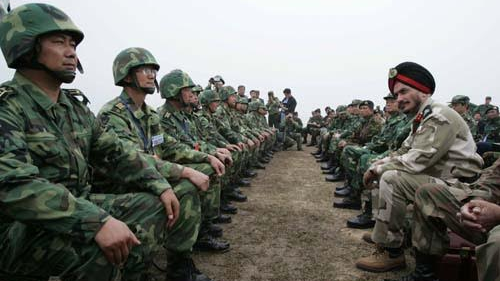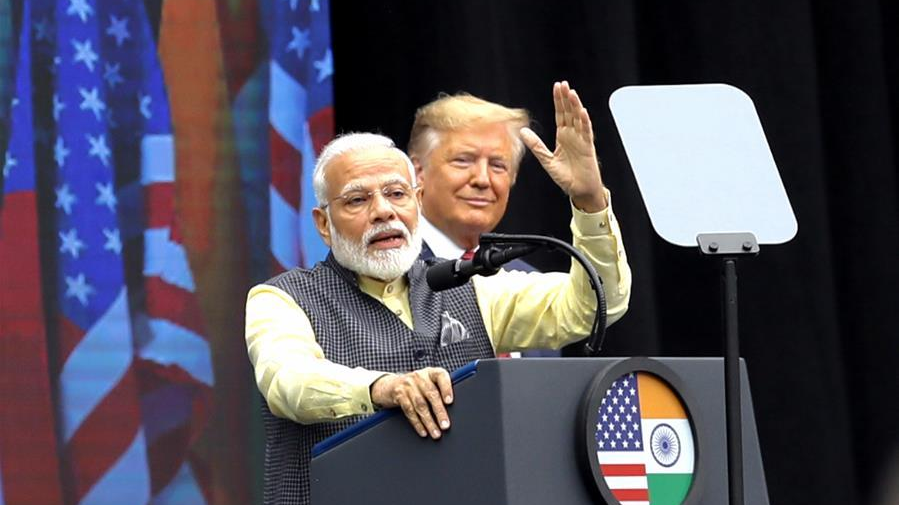
The talks led by China's Southern Xinjiang Military District chief and India's 14 Corps commander were held in the border area on the Chinese side, June 6, 2020. /Xinhua
The talks led by China's Southern Xinjiang Military District chief and India's 14 Corps commander were held in the border area on the Chinese side, June 6, 2020. /Xinhua
Editor's note: Wamika Kapur is an Indian PhD scholar of international relations at South Korea's Yonsei University. The article reflects the author's opinions and not necessarily the views of CGTN.
Many Western commentators would suggest that after the fatal Sino-India border clash, the worst violence since the 1975 clash between the two countries, India must now acknowledge China's ambitions and align itself with the U.S. in the great power competition, to contain China.
However, history would remind us that it was the destiny of a newly decolonized democracy, in the cold war era, to become a weapon to contain communism under the wing of America. India, under its first Prime Minister Pandit Jawaharlal Nehru, defied that fate by creating the Non-Alignment Movement (NAM) and became the leader of the decolonized Asian-African bloc.
Nehru was an idealist constructing India's desired reality of world peace without hegemony, accumulating goodwill by maintaining friendships, balancing between the U.S and Soviet Union, and acting as a big brother to China. The 1962 Sino-India War, his biggest policy failure and the origin of Sino-India distrust, dampened his idealism. India is at the same crossroads again and it's time to rebuild that desired reality.
Nehruvian views on initial years of Sino-India-America engagement still inform the current relationship. Legacies of the past are still present, and each country still utilizes the same lenses of ambition and self-preservation with respect to the other countries. However, what has changed is the power dynamics between the three with India lagging economically, politically and militarily.
The Truman administration considered Nehru "the most vital and influential person for U.S. objectives in Asia" and India a possible capitalist and democratic counterweight to China. India's role as an offshore balancer, its friendships with communist countries and its wariness of American hegemony in Asia are all still in place. India considered America an opportunity for modernization and economic development and still considers America its gateway to becoming a global power.

Indian Prime Minister Narendra Modi addresses the "Howdy, Modi!" rally along with U.S. President Donald Trump, Houston, Texas, U.S., September 22, 2019. /Xinhua
Indian Prime Minister Narendra Modi addresses the "Howdy, Modi!" rally along with U.S. President Donald Trump, Houston, Texas, U.S., September 22, 2019. /Xinhua
Many authors have used the framework of a strategic triangle with respect to the relationship between these countries, however, China does not view these relationships as a strategic triangle. The countries are not peers and bilateral relations are not dependent on the third party. For example, India is not a consideration for the U.S. or China when making policies with respect to each other.
For a strategic triangle there must be mutual dependency and strategic importance between countries which is absent. This framework makes India vulnerable to becoming the theater of a proxy war, a scenario which India must avoid. Instead, India must be a middle path between China and America, positioned to prevent a clash. India must re-establish its Nehruvian role of acting as a mediator and maintain its strategic autonomy.
India today, owing to its Nehruvian legacy, believes in creating a desired reality, a multi-polar world, accelerated domestic development and a role in global governance. All these ambitions connect to its relations with U.S. and China. India is in a better position today, unlike the past, to achieve its ambitions. NAM was an outlier during the Cold War but now, middle power diplomacy, hedging and balancing are the norm of international relations.
India should prepare for the future by studying how others in the past coped with the unforeseeable and unpredictable. India's choices dictated the destinies of these countries for over four decades during the Cold War and India's strategic choices today will reflect on the next four.
As with World Health Organization and United Nations Security Council, India must continue its campaign for larger representation in multilateral organizations. It must take on the role as a leader of the non-aligned wholeheartedly, balance between the two powers and manage insecurities, find the strength to construct its desired reality to achieve its own ambitions. India needs to have an idealist vision with realist ambition. In the words of current Prime Minister Narendra Modi, it must become "Atmanirbhar" (self-reliant).
(If you want to contribute and have specific expertise, please contact us at opinions@cgtn.com.)